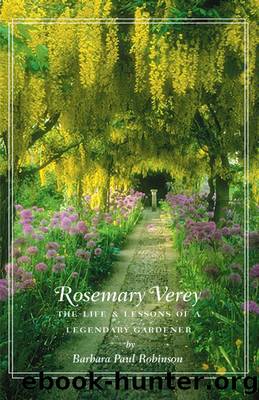Rosemary Verey by Barbara Paul Robinson

Author:Barbara Paul Robinson [Robinson, Barbara Paul]
Language: eng
Format: epub
ISBN: 9781567924862
Barnesnoble:
Publisher: David R. Godine, Publisher
Published: 2012-08-30T00:00:00+00:00
CHAPTER EIGHT
Leaving Barnsley House;
Prince Charles Arrives
Late 1980s
And now, heâs absolutely one of my best friends.
FOUR YEARS AFTER Davidâs death, as she was about to turn seventy, Rosemary decided to give Barnsley House to her oldest son, Charles. She moved into The Close, following the pattern set by Davidâs parents when they gave Barnsley House to David, and then moved into the renovated adjacent stable-cum-garage and called it The Close. Unlike Cecil and Linda Verey, who had only one son, Rosemary had four children, so it is hard to fully understand this decision. Some of her closest friends tried cautioning her against it; one of them advised her to take proper financial advice before giving away the house.1
It may well be that her decision was indeed partly the result of professional advice; taxes probably had something to do with it. Under the applicable English gift and estate tax rules, if someone made a gift and lived at least seven years thereafter, there would be no gift or estate tax on the transferred property. One would have expected the solicitors handling Davidâs estate to raise this tax strategy. But one has to wonder why Rosemary didnât give Barnsley House to all her children, or at least to a trust for their benefit. Why did she choose to give it solely to Charles?
Davidâs will did not favor Charles above his other children. To the contrary, he provided for all four of them equally. His will did not require or request Rosemary to give the house to Charles, nor did it give the house to Charles in the event Rosemary failed to survive David.2 In his will of April 29, 1984, signed just days before he died, he bequeathed Barnsley House and its gardens to Rosemary but oddly he excluded The Close and his other land holdings; he also excluded his interest in the Arlington Mill partnership, which he held with his daughters, Veronica and Davina. The will also left Rosemary all of his personal belongings but, in a rather old-fashioned way, left all the rest of his estate in a trust for Rosemaryâs benefit for her life, rather than giving her outright ownership. On her death, the will directed the trust to end and pass to all four children in equal shares (or to their issue if any one of them was not then living).3 David named Rosemary and his lawyer, John Humphrey Colquhoun, to be his executors and trustees.
Even though David appeared not to favor Charles above his other children, Rosemaryâs daughter Veronica believes that by giving Barnsley to Charles, Rosemary felt she was carrying out Davidâs wishes. Whether carrying out Davidâs wishes or not, she was following a well-established British tradition of primogeniture, a custom still prevalent in certain British circles to favor the oldest son with the lionâs share of the familyâs fortune. To modern observers, it seems positively Dickensian to leave the family estate to the oldest son, with the younger sons forced to earn their own way in the army or the church and the daughters expected to marry well to restore the family coffers.
Download
This site does not store any files on its server. We only index and link to content provided by other sites. Please contact the content providers to delete copyright contents if any and email us, we'll remove relevant links or contents immediately.
Turbulence by E. J. Noyes(8052)
The Thirst by Nesbo Jo(6944)
Gerald's Game by Stephen King(4654)
Be in a Treehouse by Pete Nelson(4052)
Marijuana Grower's Handbook by Ed Rosenthal(3687)
The Sprouting Book by Ann Wigmore(3592)
The Red Files by Lee Winter(3416)
The Remains of the Day by Kazuo Ishiguro(3413)
Sharp Objects: A Novel by Gillian Flynn(3017)
Christian (The Protectors Book 1) by L. Ann Marie(2693)
Organic Mushroom Farming and Mycoremediation by Tradd Cotter(2692)
The Culinary Herbal by Susan Belsinger(2480)
Stone Building by Kevin Gardner(2394)
The Starter Garden Handbook by Alice Mary Alvrez(2339)
Lilac Girls by Martha Hall Kelly(2306)
The Unlikely Pilgrimage of Harold Fry by Rachel Joyce(2273)
The Lean Farm Guide to Growing Vegetables: More In-Depth Lean Techniques for Efficient Organic Production by Ben Hartman(2137)
Urban Farming by Thomas Fox(2104)
Backyard Woodland by Josh VanBrakle(1932)
